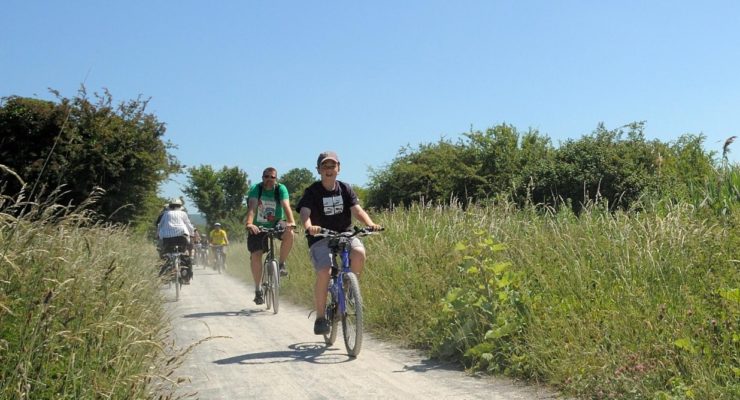Take Care of Your Teeth
Take care of your teeth. It is a basic habit to get into, improves our health and prevents needless days off work.
For specific advice on toothbrushing or taking care of children’s or vulnerable adult’s teeth, follow the links found on this page.
Tooth Brushing
When to brush teeth
It is important to brush teeth for two minutes, twice a day: before bed and at one other point in the day. Try to avoid brushing for half an hour after eating anything acidic (like fruit or fizzy drinks), as the acid will corrode teeth while you brush.
The Smart Phone App, Brush DJ is 2 minute timer that plays music for 2 minutes, bleeping every 30 seconds to remind you move to the next portion of your mouth.
Choosing toothbrushes
Use a toothbrush with a small head and soft bristles – these get into all the small gaps to remove food or germs hiding in there. For those who struggle with toothbrushing, special toothbrushes have been designed that clean three sides of the tooth at the same time.
Choosing toothpaste
Use toothpaste with fluoride in it. Teeth use fluoride to make small repairs and stay strong. Toothpaste with between 1350 and 1500 ppm fluoride gives the best protection (you can find this written on the tube).
Toothpaste that foams helps to push debris out from between teeth, but if you don’t like the foaming try “dry brushing” – don’t add water to the brush. Non-foaming options are also available.
Amount of toothpaste
For children under three, use a smear of toothpaste, for anyone over three use a pea-sized amount. Regularly using more than this, can expose teeth to too much fluoride and can lead to accidentally swallowing toothpaste.
After brushing
Spit out the toothpaste after brushing, but don’t rinse (even with mouth wash), as the fluoride in toothpaste will be absorbed by the teeth and can continue to work for several hours. To allow the fluoride to absorb, avoid eating or drinking for half an hour after brushing.
Other do’s and don’ts
Use dental floss or interdental brushes to get between the teeth, especially the tight gaps where food gets stuck. This will stop plaque building up there which will prevent bad breath and decay from forming.
Mouthwash is not recommended as part of your toothbrushing routine- using it before can cause damage to your teeth when you then brush, and using it after brushing will wash away the stronger fluoride of the toothpaste. If you like to use it try doing so at a different time of day, for example after meals to wash out the food and acid before it does any damage.
Toothpicks are not recommended as they can cause damage to gums.
Reduce sugar intake
Bacteria in the mouth feast on sugar, and when they feast on sugar they release acid. This acid is what attacks teeth and causes disease. It takes up to an hour for the mouth to recover from the acid caused by eating and drinking. It is therefore important to limit the number of times teeth are exposed to sugar, by having sugary foods and drinks just at mealtimes. Grazing or sipping on sugary foods and drinks throughout the day increases the number of times teeth come in to contact with sugar – instead, try having the sugary treat at a mealtime, that way your mouth is already working to wash food away.
Sugary foods include dried fruit, biscuits, cakes and puddings, as well as drinks such as squash and fizzy pop.
If you like to snack between meals, try some snacks that are safe for teeth. These include, fruit (which contain natural sugars but much better for teeth than sugar added to sweets etc), natural yoghurt (avoid flavoured yoghurts, but add your own flavour by topping with fruit, berries or honey), raw vegetables (great at increasing saliva production, reducing acid in the mouth, getting blood to your gums and bring a boost of fibre and vitamins), cheese (great for teeth – source of calcium and protein and low in sugar – also neutralise acid – not low in fat though so keep to small amounts), uncoated nuts (full of essential oils and fatty acids and low in sugar – only need a small amount for a snack between meals).
Squash drinks can be diluted more each day until it is mostly water, reducing the amount of sugar sitting on teeth. Water and milk are tooth-friendly drinks to have between meals.
As well as limiting the number of times you eat sugar, reducing the amount of sugar also helps to keep teeth (and bodies) healthy. The Sugar Smart Guide, is a quick guide to help reduce sugar intake, and the Food Scanner App, can help to make healthy swaps to reduce sugar in a diet.
Reduce Risk of Disease
Finally, to reduce the risk of oral diseases and to keep your teeth, gums and mouth as healthy as possible, there are a few more recommendations. Help is available for these steps and getting support greatly increases the likelihood of success; read the information here and follow the links if you’d like some help.
Alcohol and Oral Health
Alcohol is high in sugar, acidic and can reduce the amount of saliva made in the mouth. The impact of all of this, is that teeth and gums are exposed to more acid and the mouth cannot counteract the effect as easily. This will eventually lead to tooth decay as the enamel in teeth will be weakened by the increased acid level.
Regular intake of alcohol limits the ability for the mouth to correct the acid level and clean away sugars. Good oral health routines will reduce the risks caused by drinking alcohol, but reducing or stopping intake is the best way to look after teeth.
Smoking and Oral Health
Smoking tobacco can cause a number of oral health problems including, bad breath, tooth staining, gum disease, tooth loss, mouth cancer, smokers lips, dry mouth and thrush.
Ulcers are not unusual but sometimes they can be the first sign of mouth cancer. Those who smoke are at greater risk of getting mouth cancer, which effects 1,900 people in the UK every year and is a serious condition. Mouth cancer can present as a single ulcer that lasts longer than 3 weeks, has no obvious cause (eg, it isn’t near a sharp tooth) and are usually, but not always, on or under the tongue. If you smoke and notice any symptoms of concern see dentist for expert advice or call the Dental Helpline on 01788 539780.
Eating raw vegetables such as carrots, as a snack in the day, can increase saliva flow, neutralise acids in the mouth and provide a good source of fibre and vitamins. Chewing sugar free gum during the day can help to increase saliva flow and reduce (but not cure) bad breath. Similarly mouth wash does not cure the underlying problem of bad breath, but can be a short term solution when fresh breath is important. It is important for those who smoke to visit a dentist or hygienist regularly for a thorough clean.
Taking these extra precautions to care for oral health will help to alleviate some of the effects of smoking, but the biggest impact will be made upon reducing or stopping smoking.
Those who stop smoking may find that at first they suffer from side effects in the mouth, these pass after about 6 weeks, and the long term improvements will soon take the place. The initial side effects occur because tobacco smoke kills bacteria in the mouth, both good and bad, and reduces the natural antibodies in saliva. When the smoking stops, antibody and saliva production take a few weeks to improve, bacteria grows quickly, and the antibacterial properties of the smoke are not present to kill of infections. This means that bacteria takes hold fast, ulcers spring up and gums become sore sometimes swelling or bleeding.
It is important therefore when quitting, to clean mouth regularly, using mouth wash or sugar free gum after eating or snacking and brushing teeth at night plus one other time in the day. A new toothbrush within the first two weeks of quitting has also been suggested by some dental professionals.
Follow this link to the Oral Health Foundation who give more information about the effects of alcohol and smoking on dental health. Find a link to the stop smoking support service on links section of this page.
Mouth Cancer
When caught quickly the survival rate for mouth cancer is 9 out of 10. Sadly often it is not spotted soon enough. This simple check and being aware of the signs of mouth cancer can save your life.
Dentists
Guidance says to see a dentist every six months. If you are not registered with an NHS dentist, you can find your nearest one accepting new patients by following this link. Private dentists are also available and tend to have a shorter waiting lists for appointments, but will cost more money for check ups and treatments.
NHS dental services are free for under 18s.
Dentists may give advice about lifestyle changes or recommend courses of treatment. It is important that this advice is taken seriously as it can reduce future problems, pain and cost.
If you get any pain or problems with your teeth, it is important that you seek dental help as soon as possible because most problems with teeth cannot self-heal.
In a dental emergency or out of hours you can call 111, use NHS 111 online “Get Dental Help” service, or visit the NHS website.
Free, impartial advice on any dental or oral health issue is available from the Dental Helpline: 01788 539780 (local UK call rate).
For more information about NHS cost bands for dental care and who can access free dental care on the NHS, visit the NHS website.





